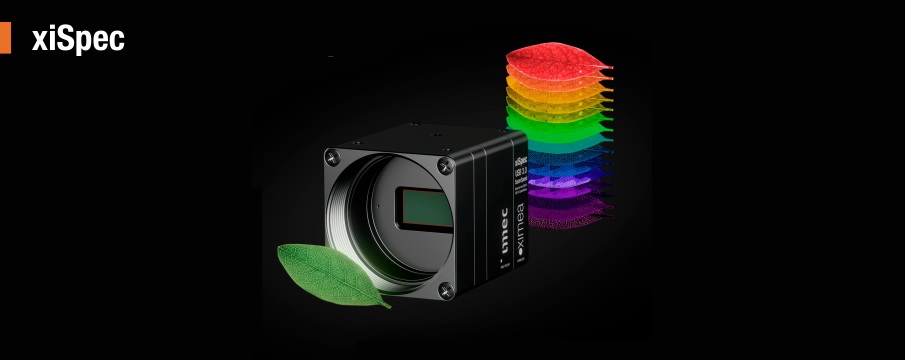
xiSpec HyperSpectral Cameras
»As a world-leading nanoelectronics R&D center, …, our collaboration with XIMEA has been a key element for our technology to find its way to the market« – Andy Lambrechts, program director at imec
MUNSTER, Germany (PRWEB)
December 07, 2020
While maintaining the previous dimensions of only 26.4 x 26.4 x 32 mm and a flyweight of mere 32g, the camera housing and the bandpass filters have been optimized to improve the spectral performance of the cameras. Each xiSpec2 camera is individually calibrated.
The new xiSpec2 camera series come with high spectral fidelity and consists of the following models:
Camera model, Description, Spectral range, Spectral bands
- MQ022HG-IM-SM4X4-VIS2, Snapshot visible light, 480 – 625 nm, 10 channels
- MQ022HG-IM-SM4X4-RN2, Snapshot Red-NIR, 600 – 860 nm, 15 channels
- MQ022HG-IM-SM5X5-NIR2, Snapshot NIR, 665 – 960 nm, 24 channels
- MQ022HG-IM-LS150-VN2, Line scan 150 VIS-NIR, 470 – 900 nm, 150 channels
All details and data sheets can be found here: https://www.ximea.com/en/products-news/hyperspectral-imaging-camera-small
New starter kits will be offered matching the new cameras to ensure a smooth start-up and spectral data quality.
The snapshot cameras will be delivered with imec’s HSI-Mosaic suite.
This means access to imec’s hyperspectral API (including manuals and sample data) and XIMEA’s camera SDK.
The line scan cameras will be sold to OEM customers after clarification of the project use.
As part of the collaboration, XIMEA and imec plan to offer xiSpec customers tailored support to integrate the hyperspectral cameras into their application.
The standard xiSpec2 cameras come with USB3 micro-B connectors.
For projects where integration into limited space is required, models with USB3 flat-ribbon connection or PCIe interface will also be available in a later phase.
The PCIe interface enables bandwidths of 10 Gbit/s with the lowest power consumption and allows access to the maximum framerate potential of the sensors.
The new xiSpec2 cameras can be ordered and delivered starting in December 2020.
“As a world-leading nanoelectronics R&D center, imec has developed unique CMOS-based hyperspectral imaging technology that, over the years, has resulted in a set of top-class hyperspectral image sensors and hyperspectral camera solutions with extreme compactness, low weight and high reliability. Our collaboration with XIMEA has been a key element for our technology to find its way to the market,” stated Andy Lambrechts, program director at imec. “With this extension of the collaboration with XIMEA, we take a next step. By offering our tailored technical support to xiSpec2 customers, we guarantee the quality needed to fully reap the capabilities of this promising technology.”
What are hyperspectral imaging cameras ?
Conventional color cameras use a mosaic pattern of red, green and blue (RGB) color filters on top of the pixel matrix.
Hyperspectral cameras replace the RGB pattern with a combination of many different wavelength filters.
The numerous color filters attached to standard cameras increase the complexity of the de-mosaicking and reduce the spatial resolution.
The new HSI cameras deliver spectra for individual narrow bands with a different set of data that can indicate the (bio)chemical state or composition of the objects.
Thanks to the high frame rate of the image sensor, these cameras ensure detailed and crisp captures of moving objects at multiple wavelengths in real-time.
Thereby the objects can be moved orthogonally to the horizontal color filters of a mounted camera, e.g. on a conveyor belt, or attached to UAV.
The visual and near-infrared (NIR) spectrum of these cameras is especially relevant in agriculture.
For more information, you can check the below documentation and other materials or contact XIMEA team and find out what HSI can add to your business.
About XIMEA
For more than 20 years XIMEA has developed, manufactured and sold standard and OEM cameras for machine vision applications in motion control, assembly, robotics, industrial inspection and security, as well as scientific grade cameras for life science and microscopy. The main distinction is based on flexibility of development and production processes, and extremely robust way the cameras are built while still providing highest speed and power. Drawing on more than two decades of experience in the industry, XIMEA offer consists of state-of-the-art cameras with FireWire, USB 2.0, USB 3.0 and smart cameras with embedded PC and GigE interface.
Learn more about XIMEA at http://www.ximea.com
About imec
Imec is a world-leading research and innovation hub in nanoelectronics and digital technologies. The combination of our widely acclaimed leadership in microchip technology and profound software and ICT expertise is what makes us unique. By leveraging our world-class infrastructure and local and global ecosystem of partners across a multitude of industries, we create groundbreaking innovation in application domains such as healthcare, smart cities and mobility, logistics and manufacturing, energy and education.
As a trusted partner for companies, start-ups and universities we bring together more than 4,000 brilliant minds from almost 100 nationalities. Imec is headquartered in Leuven, Belgium and has distributed R&D groups at a number of Flemish universities, in the Netherlands, Taiwan, USA, and offices in China, India and Japan. In 2019, imec’s revenue (P&L) totaled 640 million euro.
Further information on imec can be found at http://www.imec-int.com.
Share article on social media or email:

